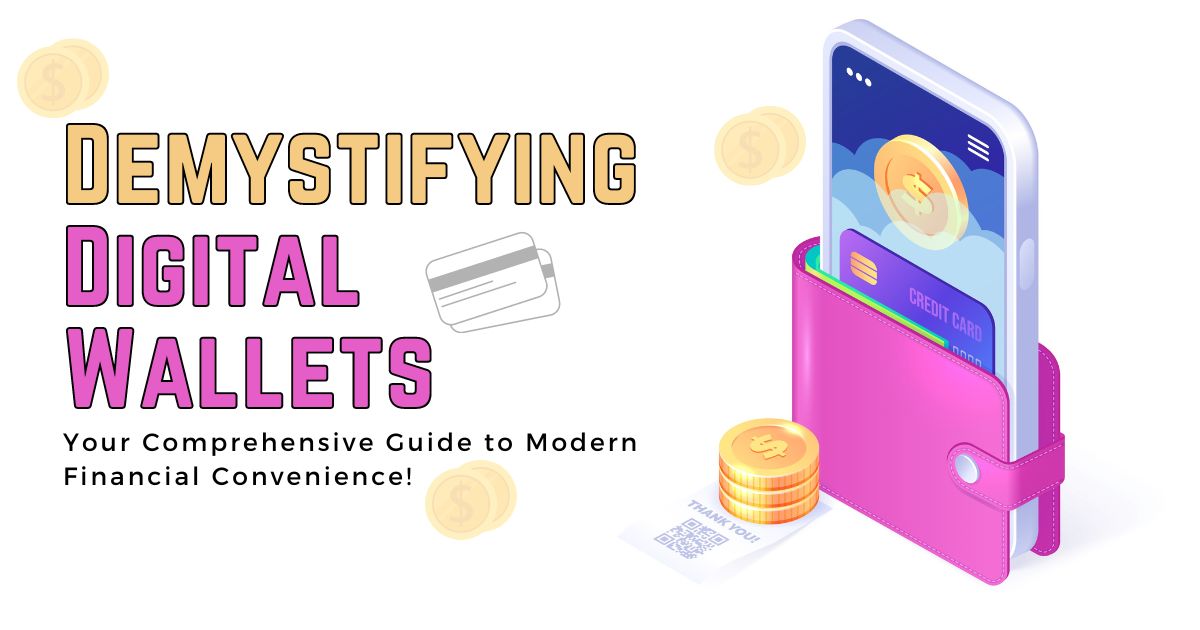
| February 28th, 2024 |
Demystifying Digital Wallets — Your Comprehensive Guide to Modern Financial Convenience!
In today’s rapidly evolving digital landscape, the concept of carrying a physical wallet stuffed with cash and cards is becoming increasingly outdated. Instead, more and more people are embracing the convenience and efficiency of digital wallets. But what exactly is a digital wallet, and how does it work? In this comprehensive guide, we’ll delve deep into the world of digital wallets, covering everything you need to know to understand and leverage this modern financial tool effectively.
What is a Digital Wallet?
A digital wallet, also known as an e-wallet or mobile wallet, is a virtual platform that allows users to store, manage, and transact various forms of digital currencies and payment methods securely. Unlike traditional wallets, which hold physical cash and cards, digital wallets store digital representations of money, such as credit and debit card information, bank account details, cryptocurrencies, and loyalty points.
How Do Digital Wallets Work?
Digital wallets work by securely storing users’ payment information and facilitating transactions through digital channels. When a user makes a purchase or sends money using a digital wallet, the wallet software encrypts the transaction details and sends them to the recipient’s wallet or the payment gateway. The transaction is then validated and processed, allowing the transfer of funds from the sender’s wallet to the recipient’s account.
Types of Digital Wallets —
There are several types of digital wallets available, each catering to different needs and preferences:
- Mobile Wallets: These wallets are accessed via mobile devices and are often provided by mobile payment providers like Apple Pay, Google Pay, and Samsung Pay.
- Desktop Wallets: Desktop wallets are software applications installed on computers or laptops, allowing users to manage their digital currencies and make transactions from their desktops.
- Online Wallets: Also known as web wallets, these wallets are cloud-based platforms accessed through web browsers, providing convenient access to funds from any internet-connected device.
- Hardware Wallets: Hardware wallets are physical devices that store users’ private keys offline, providing an extra layer of security against cyber threats.
Advantages of Using Digital Wallets —
Digital wallets offer several benefits over traditional payment methods, including:
Convenience:
Users can store all their payment information in one place and make transactions with a few taps or clicks, eliminating the need to carry physical cards or cash.
Accessibility:
Digital wallets can be accessed anytime, anywhere, allowing users to make payments or transfer funds from their mobile devices or computers.
Security:
Most digital wallets employ advanced encryption techniques and authentication measures to protect users’ sensitive financial information from unauthorized access or fraud.
Cost-Effectiveness:
Digital wallets often eliminate the need for physical infrastructure associated with traditional payment methods, such as printing and distributing plastic cards, reducing operational costs for businesses and potentially leading to cost savings for consumers.
Instantaneous Transactions:
Unlike traditional payment methods that may involve processing delays, digital wallet transactions are typically processed in real-time or near-real-time, allowing users to complete transactions quickly and efficiently.
International Accessibility:
Digital wallets can facilitate cross-border transactions with ease, enabling users to send and receive payments internationally without the need for currency conversion or high transaction fees often associated with traditional banking systems.
Integration with Rewards Programs:
Many digital wallets integrate seamlessly with loyalty and rewards programs, allowing users to earn points, cashback, or other incentives for their transactions, enhancing the overall value proposition for consumers.
Environmental Sustainability:
By reducing reliance on physical payment methods like cash and plastic cards, digital wallets contribute to environmental sustainability by minimizing paper usage, reducing plastic waste, and lowering carbon emissions associated with transportation and production.
Financial Inclusion:
Digital wallets have the potential to increase financial inclusion by providing access to financial services for underserved populations, including those without access to traditional banking infrastructure, enabling them to participate in the digital economy and improve their financial well-being.
Personalized Offers and Recommendations:
Digital wallets can leverage data analytics and machine learning algorithms to offer personalized recommendations, discounts, and promotional offers tailored to users’ preferences and spending habits, enhancing the overall shopping experience.
Security Measures in Digital Wallets —
Security is a top priority for digital wallet providers, and they employ various measures to safeguard users’ funds and personal information. Some common security features include:
- Encryption: All sensitive data transmitted between the user’s device and the wallet server is encrypted to prevent interception by malicious parties.
- Biometric Authentication: Many digital wallets support biometric authentication methods such as fingerprint or facial recognition to ensure that only authorized users can access their accounts.
- Tokenization: Digital wallets often use tokenization technology to replace sensitive payment information with unique tokens, reducing the risk of data breaches.
Future Trends in Digital Wallet Technology —
As technology continues to advance, digital wallets are expected to evolve to meet the changing needs and preferences of consumers. Some emerging trends in digital wallet technology include:
- Blockchain Integration: Blockchain technology is increasingly being integrated into digital wallets to enhance security, transparency, and decentralization.
- IoT Payments: The Internet of Things (IoT) is enabling new payment methods, allowing users to make transactions directly from connected devices like smartwatches and IoT-enabled appliances.
- Contactless Payments: Contactless payment methods, such as NFC (Near Field Communication) and QR codes, are becoming more prevalent, offering faster and more convenient ways to pay.
Conclusion —
In conclusion, digital wallets have revolutionized the way we manage and transact digital currencies and payment methods. With their convenience, accessibility, and security features, digital wallets offer a compelling alternative to traditional payment methods. By understanding how digital wallets work and staying informed about the latest trends and developments in the industry, users can harness the full potential of this modern financial tool and enjoy seamless and secure digital transactions.
